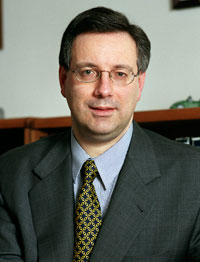 A researcher known internationally for his vision of cleaner, more efficient generation of transportation energy has been named director of the University of Michigan’s energy institute.
A researcher known internationally for his vision of cleaner, more efficient generation of transportation energy has been named director of the University of Michigan’s energy institute.
Dennis Assanis, the Jon R. and Beverly S. Holt professor of engineering and Arthur F. Thurnau professor, will be director of the Michigan Memorial Phoenix Energy Institute, Stephen Forrest, U-M vice president for research, has announced.
“Dennis brings to the energy institute a wealth of research knowledge in the transportation domain, still one of the largest energy-using sectors,” Forrest said. “Add to that his extensive interactions with industry and experience leading large research programs and this puts the institute in position to expand its leadership role in the region and the nation.”
Assanis will take the position July 1, replacing Gary S. Was, a nuclear engineering professor who has led the institute since it began in September 2006, charged with developing, coordinating and promoting the vast array of multidisciplinary energy research, policy and education at the U-M.
“During Gary’s tenure as director, he has been able to very successfully launch the institute as a university-wide resource,” Forrest said. “Gary has demonstrated exceptional leadership and insight into the complicated issues surrounding all aspects of energy.”
In 2008, U-M undertook approximately $43.5 million in grant-funded research ranging from energy storage and solar energy to automotive technologies. Additionally, U-M faculty are involved in studying public expectations and reactions to new energy innovations and probing what policymakers need to make good decisions.
Assanis’s work has focused on developing new transportation technologies that minimize the use of fossil fuels and generate reduced greenhouse gases and pollution. He is director of the Automotive Research Center, the Walter E. Lay Automotive Laboratory, and the Multi-University Consortium on Homogeneous Charge Compression Ignition Engine Research. He also is co-director of the General Motors Collaborative Research Laboratory on Engine Systems.
Assanis joined the U-M in 1994 as a professor of mechanical engineering, coming from the University of Illinois at Urbana-Champaign. Since 2003, he has been a guest professor at Shanghai Jiao Tong University, China and was an adjunct research scientist at the Energy and Environmental Systems Division of Argonne National Laboratory.
Assanis received his bachelor’s degree in marine engineering from Newcastle University, UK. He holds four graduate degrees from the Massachusetts Institute of Technology, Cambridge: a master’s degree in naval architecture and marine engineering, a master’s degree in mechanical engineering, a doctorate in power and propulsion, and a master’s degree in management from MIT’s Sloan School of Management.
Assanis is recognized internationally for his innovative development of modeling methodologies and experimental techniques to shed light on complex thermal, fluid and chemical processes in internal combustion engines to improve fuel economy and reduce emissions. The engine system simulations Assanis has developed with his students and collaborators are being used in industry and national laboratories.
He has published with his students and collaborators more than 250 articles in journals and conference proceedings. He is a member of the National Academy of Engineering, a fellow of the Society of Automotive Engineers and of the American Society of Mechanical Engineers.
“My career has been dedicated to developing fundamental knowledge, transforming discoveries into technologies, and educating the future workforce so as to create systems that use energy efficiently and wisely, harness new forms of energy, and utilize energy in ways symbiotic with our ecosystem,” Assanis said. “Providing leadership to an energy effort as powerful and complete as the University of Michigan’s is a tremendous opportunity to catalyze change needed to address three of the world’s most serious challenges: energy security, climate change and environmental sustainability.”
Forrest said: “Energy may be the single most important research-related issue facing humankind. The country needs Michigan to succeed in both the technological as well as policy and behavioral science aspects of the energy challenge. Dennis and the energy institute are poised to lead this effort.”